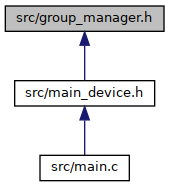Handles all procedures releated to file operation issued on a group device. More...
#include <linux/module.h>#include <linux/kernel.h>#include <linux/fs.h>#include <linux/cdev.h>#include <linux/device.h>#include <linux/slab.h>#include <linux/uaccess.h>#include <linux/semaphore.h>#include <linux/ioctl.h>#include <linux/string.h>#include <linux/idr.h>#include <linux/errno.h>#include <linux/cred.h>#include "message.h"
Include dependency graph for group_manager.h:

This graph shows which files directly or indirectly include this file:

Go to the source code of this file.
Macros | |
| #define | INVALID_IOCTL_COMMAND -1 |
| #define | ALLOC_ERR -2 |
| #define | MEM_ACCESS_ERR -5 |
| #define | CLASS_EXISTS -10 |
| #define | CLASS_ERR -11 |
| #define | DEV_CREATION_ERR -12 |
| #define | CDEV_ALLOC_ERR -13 |
| #define | EMPTY_LIST -20 |
| #define | NODE_NOT_FOUND -21 |
| #define | CHDEV_ALLOC_ERR -22 |
| #define | GROUP_MAX_MINORS 255 |
| #define | DEVICE_NAME_SIZE 64 |
| #define | DEFAULT_MSG_SIZE 256 |
| #define | DEFAULT_STORAGE_SIZE 1024 |
| #define | IOCTL_GET_GROUP_DESC _IOR('Q', 1, group_t*) |
| #define | IOCTL_SET_STRICT_MODE _IOW('Q', 101, bool) |
| #define | IOCTL_CHANGE_OWNER _IOW('Q', 102, uid_t) |
| #define | IOCTL_SET_SEND_DELAY _IOW('Y', 0, long) |
| #define | IOCTL_REVOKE_DELAYED_MESSAGES _IO('Y', 1) |
| #define | IOCTL_CANCEL_DELAY _IO('Y', 2) |
| #define | IOCTL_SLEEP_ON_BARRIER _IO('Z', 0) |
| #define | IOCTL_AWAKE_BARRIER _IO('Z', 1) |
| #define | GROUP_CLASS_NAME "group_synch" |
Functions | |
| void | initParticipants (group_data *grp_data) |
| Initialize group_data participants' structures. More... | |
| int | installGroupClass (void) |
| Install the global 'group_device_class'. More... | |
| int | registerGroupDevice (group_data *grp_data, struct device *parent) |
| register a group device More... | |
| void | unregisterGroupDevice (group_data *grp_data, bool flag) |
| unregister a group device More... | |
| int | copy_group_t_from_user (__user group_t *user_group, group_t *kern_group) |
| Copy a 'group_t' structure to kernel space. More... | |
Variables | |
| struct class * | group_device_class |
Detailed Description
Handles all procedures releated to file operation issued on a group device.
Function Documentation
◆ copy_group_t_from_user()
Copy a 'group_t' structure to kernel space.
- Parameters
-
[in] user_group Pointer to a userspace 'group_t' structure [out] kern_group Destination that will contain the 'group_t' structure
- Return values
-
0 on success MEM_ACCESS_ERR if the user memory is not valid for the kernel USER_COPY_ERR if there was error while copying user data to kernel ALLOC_ERR if there was some meory allocation error
◆ initParticipants()
|
inline |
Initialize group_data participants' structures.
- Parameters
-
[in] grp_data Pointer to the device's group_data structure
- Returns
- nothing
◆ installGroupClass()
| int installGroupClass | ( | ) |
Install the global 'group_device_class'.
- Return values
-
0 if the class already exists CLASS_ERR If the class cannot be installed CLASS_EXISTS If the class already exists
◆ registerGroupDevice()
| int registerGroupDevice | ( | group_data * | grp_data, |
| struct device * | parent | ||
| ) |
register a group device
- Parameters
-
[in] grp_data The group data descriptor [in] parent device parent (usually 'main_device')
- Return values
-
0 on success CHDEV_ALLOC_ERR If the char device allocation fails ALLOC_ERR If some memory allocation fails DEV_CREATION_ERR If the char device creation fails
- Note
- Charter device creation This should be perfomed after all the all the necessary data structures are allocated since, immediately after 'cdev_add', the device becomes live and starts to respond to requests
◆ unregisterGroupDevice()
| void unregisterGroupDevice | ( | group_data * | grp_data, |
| bool | flag | ||
| ) |
unregister a group device
- Parameters
-
[in] grp_data The group data descriptor
- Returns
- nothing
- Note
- This guarantees that cdev device will no longer be able to be opened, however any cdevs already open will remain and their fops will still be callable even after cdev_del returns. For this reason the 'initialized' flag of a group will be set to zero
- Todo:
- : Check if this causes starvation
 1.8.17
1.8.17